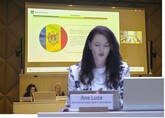
Provisions of Moldova’s new Land Code, enabling local authorities to lease out lands unused by their owners for 2 consecutive years, will come into force as of April 1
Ministry of Agriculture and Food Industry reported this, noting that, in particular, this document specifies the mechanisms of intervention in situations when agricultural lands deteriorate, causing damage to neighboring lands, especially those cultivated by other farmers. In particular, if the owner of agricultural land does not maintain the land in phytosanitary condition (weed control) for more than 2 consecutive years, the local public administration authority may reserve the right to manage the land in question by leasing it. Representatives of the local Mayor's Office and the National Agency for Food Safety, at the request of the owner of the adjacent land whose interests have been violated, will inspect the land and determine whether it is abandoned and overgrown with weeds. If it is confirmed that the land has not been maintained for at least 2 years and its phytosanitary condition is unsatisfactory, the Mayor's Office will send a written notice to the owner. The land owner will be notified of the need to take the necessary measures regarding the use of the land within 3 months, and if the notice received by the land owner remains unanswered, the local authority will decide to lease the land through open bidding or, as the case may be, through direct negotiations to the sole owner of the adjacent land. Thus, if the land borders only one property, the Mayor's Office will be able to negotiate directly with the neighbor interested in cultivating it. Otherwise, the land will be put up for public auction so that anyone interested can lease it legally and transparently. The auction will be organized by a special committee of the Mayor's Office, consisting of employees of the institution, and will be announced publicly at least 15 days before the event. Once the winner of the auction is selected, the land will be handed over under an official acceptance certificate and the person who won the lease will be able to start processing it. The term of the lease agreement will be set by the Mayor's Office and the lessee, but not less than 1 year and not more than 5 years. At the end of the term, the agreement can be renewed if both parties agree. The amount paid by the lessee for the use of the land will be kept by the Mayor's Office in a special account. The owner can reclaim his land at any time by submitting a written request. From then on, the lease is immediately terminated; the money collected from the lease goes to the owner, minus the administrative costs incurred by the Mayor's Office for this procedure. “The owner does not lose his land. He/she remains the legal owner of the land, and the lease is only a temporary measure to prevent land degradation and protect neighbors. Respect for private property remains a fundamental principle, but in situations where farmland remains in an inadequate condition for a long time and affects surrounding land, the intervention of local authorities becomes necessary to prevent harm to other members of the community,” the Agriculture Ministry said. // 31.03.2025 - InfoMarket







